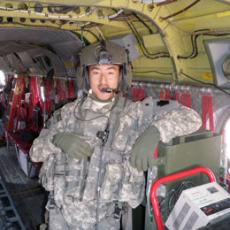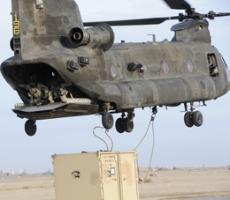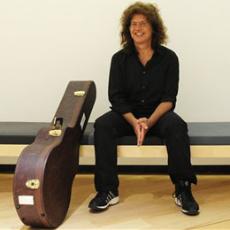DOUG JOHNSON: Welcome to AMERICAN MOSAIC in VOA Special English.
(MUSIC)
I'm Doug Johnson. This week on our show, we have a new album from guitarist Pat Metheny ...
And we tell you what some universities are doing to become more environmentally friendly ...
But, first, we hear the story of a soldier who served in Afghanistan and Iraq.
(MUSIC)
A Soldier's Story

DOUG JOHNSON: Fireworks filled the sky Monday night as Americans celebrated Independence Day. On July 4th, 1776, colonists meeting in Philadelphia, Pennsylvania, approved the Declaration of Independence from Great Britain. Eight years of war -- the American Revolution -- lasted until 1783.
This week the celebrations included events to honor members of the military. Military service is voluntary, and less than one percent of Americans serve. Special English writer Kim Varzi recently met a veteran of the wars in Iraq and Afghanistan and asked him to tell his story.
Michael Johnston served in the Navy and, later, on active duty as a sergeant with the Pennsylvania Army National Guard. He worked with helicopters.
MICHAEL JOHNSTON: "My main role was aviation maintenance, so we made sure the aircraft were maintained daily. And then when needed we would also fly. We would rotate through and fill in the gaps, make sure people weren't getting burned out and were able to have time off. That pretty much was our main objective while we were deployed."
What was an average day like for him in Afghanistan?

MICHAEL JOHNSTON: "Our day was actually at night, because we could only fly at night, so we did all of our missions and everything during the hours of darkness. So it just became a routine of, you wake up, you go out to the aircraft, you prepared for the mission. You get your brief, as to what you are going to be doing, where you are going. You execute it, come back, you do maintenance and you go to sleep."
Michael Johnston is 27. He was first deployed to Iraq in 2003 at the beginning of Operation Iraqi Freedom. He returned to Iraq in 2009 and found that much had changed.
MICHAEL JOHNSTON: "Just like law and order in general. What would have been comparable to the Wild West, being in the Wild West, where there literally was just chaos, no law and order, as to now where there actually was law and order. You could actually see it. You would be able to see the Iraqi army, the Iraqi police out there, as opposed to obviously the absolute collapse in 2003, and then the progression coming up into 2009 is unreal."
He has good memories of meeting Iraqi and Afghan civilians who worked on American bases.
MICHAEL JOHNSTON: "Its just really amazing to see their tenacity and just their strength. I feel as though here in the States we all tend to take things for granted, just the simplest little things, like clean water. You know, just the weather, then too. I mean, these people, day in and day out, they have nothing. They just make do with what they have and they try to make the best of it. And that is just unbelievable to see, just the human spirit."
Michael Johnston says his military experience has taught him to appreciate life and to try to enjoy every day. He has just completed university studies and is working in Washington for a defense company. But he still has two years with the National Guard. This means he could be deployed again. Would he want to go?
MICHAEL JOHNSTON: "Absolutely, in a heartbeat."
(MUSIC)
Green Universities
DOUG JOHNSON: College students may find a greener campus when they return to classes this fall. Some schools are repairing older buildings and building new ones that are better for the environment. Other steps include adding wind and solar energy systems and planting vegetable gardens. Katherine Cole tells us about a university here in the nation's capital.
KATHERINE COLE: George Washington University is a private school with 20,000 students. Eloise Smith just graduated from GW, but she still helps care for a community garden on campus.
ELOISE SMITH: "These are little squash blossoms. You pick the male ones because those aren't the ones that will turn into the vegetable."
The university has two gardens where students volunteer their time.
Meghan Chapple-Brown directs the Office of Sustainability. She says that over the last ten years GW has developed projects in three main areas.
MEGHAN CHAPPLE-BROWN: "Climate, water and eco-systems. We have begun to create projects on the ground that addresses climate change. We are planning on becoming carbon-neutral and, in fact, reducing our footprint by 40 percent by 2025. So everything from creating solar hot-water systems on our rooftops to making our buildings much more energy efficient."
Ms. Chapple-Brown says the school also offers 140 different classes in sustainability and the environment.
The university is investing about two million dollars in green efforts. Officials say they are already seeing lower costs for water and energy use.
Sophie Waskow from the Sustainably Office points to a rainwater collection system on a building where students live.
SOPHIE WASKOW: "This is a rain barrel and it is connected to a down spout from the roof of this residence hall."
The rainwater is used to help water campus grounds. Collecting it also reduces runoff of storm water to the nearby Potomac River.
The Sustainable Endowments Institute is a research and education group. It says most high school students consider a college's environmental performance when choosing schools. Executive Director Mark Orlowski says colleges have moved quickly to write green building policies.
MARK ORLOWSKI: "We see numbers like less than 20 percent of schools having a green building policy five years ago, and now upwards of 80 percent of schools having a policy, that states that their new buildings will be built in a green fashion."
George Washington University is located in the Foggy Bottom neighborhood of Washington. Some neighbors say that while GW is trying to be friendlier to the environment, it could also be a better friend to the neighborhood. The school has expanded repeatedly and there have been tensions between students and local residents.
This is what longtime resident Susan Trinter, editor of the Foggy Bottom News, said in a Washington Post story earlier this year: "There seem to be many more students living off-campus now. That, and the fact that it seems that GW is always pushing beyond its boundaries, has been a perennial issue for residents here."
(MUSIC)
Pat Metheny
Jazz guitarist Pat Metheny has been writing and performing music for more than 30 years. His work as a solo artist and leader of the Pat Metheny Group has earned him 18 Grammy Awards. Pat Metheny returns to his roots in acoustic guitar on his latest album. Faith Lapidus tells us more.

FAITH LAPIDUS: The album is called "What's It All About." Pat Metheny describes it as "an exploration into unknown territory." "What's It All About" is his first album where all the music was written by other composers.
He chose ten songs including hits like "The Sound of Silence," originally performed by Paul Simon and Art Garfunkel. Here is Pat Metheny's version.
(MUSIC)
And here is the Simon and Garfunkel hit from 1965.
(MUSIC)
In the early 1970s, the Stylistics had a hit with "Betcha By Golly, Wow."
(MUSIC)
The new version from Pat Metheny has a similar sweetness, even without words.
(MUSIC)
We leave you with another cut from "What's It All About." Here is Pat Metheny's version of the Beatles song "And I Love Her."
(MUSIC)
DOUG JOHNSON: I'm Doug Johnson. Our program was written by Kim Varzi and Caty Weaver, who was also our producer. Do you have a question about American life? Write to mosaic@voanews.com or go to voaspecialenglish.com and click on the Contact Us link at the bottom of the page.
Join us again next week for music and more on AMERICAN MOSAIC in VOA Special English.
down spout: a pipe to carry rainwater from a roof to a drain or to ground level 雨落管
Pets2Vets Group is helping soldiers deal with stress disorder
'Green' Cities Are Organizing to Protect the Environment
'A View From the Bridge' is looking better than ever
(來源:VOA 編輯:崔旭燕)
